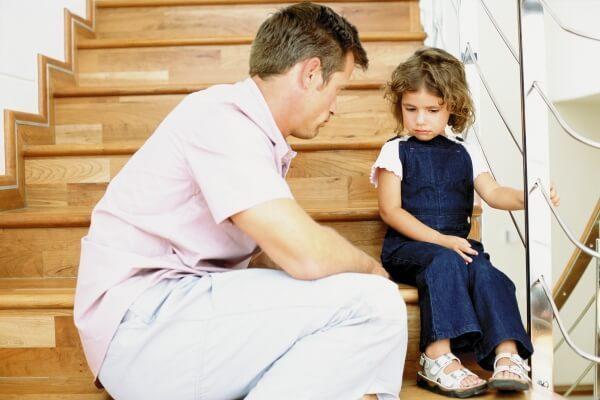7 mistakes of parents that prevent children become leaders
 Bashny.Net
Bashny.Net
How we are destroying the future of their children and how to stop doing it.
The expert on leadership, author of the psychological bestseller Tim Elmore during their research brought the typical mistakes of parents who are pre-programmed in the children uncertainty and limit their chances to achieve happiness.
Elmore describes these errors and how to stop committing them.

1. We do not give children to take risks
We live in a world which at every step warns us of danger. "Security is important", we think; we are afraid of losing their children and do everything to protect them. Yes, that is our task. But we isolate them from healthy risk, and it is having the opposite effect.
European psychologists have found that if the child does not play outside and the parents do not give him even a knee tear, then in adulthood it tends to suffer from phobias. Children need to fall down to know it was okay. Teens likely need to break up with a girl (guy) to feel emotional maturity, which require a long-term relationship.
If parents remove risk from children's lives, we are likely to see in our new leaders arrogance and low self esteem.
2. Too often we rush to the aid
Today's generation of young people has not developed some skills, what possessed the children and adolescents 30 years ago because adults burst in and immediately take on their problems. When we too quickly come to the rescue and surround the children with unnecessary help, we relieve them from having to cope with difficulties and solve problems. This short-sighted approach that misses the meaning of leadership: to prepare young people to cope without help. Sooner or later, kids get used to someone they will always help and smooth out the consequences of wrong actions. But the real world operates differently, and therefore, this behavior gives our children to become competent adults.

3. We too easily admire them
The movement for the strengthening of self-evaluation began with the generation of baby boomers, and in the 1980s it took root at school. Go to school game and you will see that everyone is the winner. Everyone should get some prize. This attitude makes children feel special, but studies show that this method has side effects.Children eventually get used to it, that the parent is the only one who thinks they're geniuses, even when all others are silent. They begin to doubt the objectivity of their parents; at first it looks nice, but the link with reality is broken. When we too easily and readily emitted shouts of delight, and ignoring the wrong behavior, children learn to cheat, exaggerate and lie to avoid uncomfortable reality. Because they are not prepared to the meeting with her.
4. Guilt does not educate leadership
Your child is bound to love you every moment of your life. Children will be able to deal with disappointment, but they will not cope with the consequences of what their pet. Tell them "no" or "not now", and let them fight for what they really appreciate and need. We as parents tend to give them what they want, when rewarding them, especially when children in the family several. When one something good happens, it seems to us unfair to praise and reward only him. This is an unrealistic approach and it does not allow us to show the children that success depends on our own actions and good deeds. And don't teach them that a good estimate will necessarily be followed by a trip to the store. If your relationship is based on material rewards, kids will be neither intrinsic motivation nor unconditional love for you.
5. We do not share your own past mistakes
Normal teenagers always want to spread your wings, to try something themselves. We must allow them that, but that doesn't mean we shouldn't help them find the course in these rough waters. Share with them the mistakes you made at their age in similar situations, only talk about them so that it helped children to make the right choice. (Avoid "negative lessons" related to Smoking, alcohol, drugs, etc.)
In addition, children should be ready to punctures and should be aware of the consequences of their decisions. Tell us how you felt when you had similar experiences that have led you and what did you understand in the end.
We do not just affect our children — we must be the best patterns of behavior.

6. We mistake intelligence, giftedness and influence with maturity
Intelligence is often used as an indicator of the maturity of the child, and as a result parents assume an intelligent child is ready to enter this world. This is not so. Some athletes and young Hollywood stars, for example, show the incredible talent, but still fall into public scandals. Although giftedness is present in one aspect of a child's life, do not make the conclusion that it manifests itself in all other respects. There is no magic age at which children become responsible, there is no proven rules exactly when the child needs to give a particular freedom.
But there is a simple advice: observe other children the same age. If you see that they are doing more themselves than your children, you may delay the time of independence in your child.
7. We do not do what you expect from children
Our responsibility as parents to set the example for the life that we want for our children to live. Help them to be strong, reliable and accountable for their words and deeds. You need to start with complete honesty in the words: "a white lie" in the end, will reveal and convict you.
Observe yourself: how do you make ethical choices in minor situations, when others can see — because your children can see it. If you do not cheat and do not cheat, they will realize that this is unacceptable for them. Show the children how selfless and happy to volunteer. Change other people and places where you have been, for the better, and your children will notice it and will start to do so.

Why all these errors happen?
Play a role and fear, and a lack of understanding. But the main thing — every generation of parents tries to compensate for what he did the previous generation. Parents focused on "now" and not on what will happen next. They think about the happiness of the child today, not ready for living tomorrow. This is a reaction to the past. Parents today's parents are often too pressed on them, preparing them for the future: we need to save money, not waste; it is necessary to prepare for retirement. In response, many of us decided that the main thing is to appreciate the present. The way we do. For many, by the way, this has led to large debts and an inability to defer gratification. This is perhaps our main problem. But parents who are able to think not only about the present but about the future, achieve more.
Also interesting: does it really proper upbringing?
Parenting without stereotypes or 5 favorite books of my son
How to stop and change their actions for the better
It is better to be aware of their words and actions in communication with children and with other people, with the kids around. Don't just throw them a good life, but train, train them.
Here's where to start:
1. Discuss those things that you yourself as a child should know about adult life.
2. Allow children to do things that bother and let them fail.
3. Discuss the possible consequences of what they do not learn certain subjects.
4. Help them to apply their strengths to real problems.
5. Prepare for the projects that require patience and teach them to postpone gratification.
6. Teach them that life is choices and trade-offs; it's impossible to do everything you desire.
7. Let them (or simulate) adult tasks like paying bills or transactions.
8. Introduce them to potential mentors from among your acquaintances.
9. Help them to imagine a satisfactory future is, and then discuss what needs to be done to be there.
10. Celebrate with them their successes on the path to independence and responsibility.published
Source: ideanomics.ru/articles/1754
The expert on leadership, author of the psychological bestseller Tim Elmore during their research brought the typical mistakes of parents who are pre-programmed in the children uncertainty and limit their chances to achieve happiness.
Elmore describes these errors and how to stop committing them.

1. We do not give children to take risks
We live in a world which at every step warns us of danger. "Security is important", we think; we are afraid of losing their children and do everything to protect them. Yes, that is our task. But we isolate them from healthy risk, and it is having the opposite effect.
European psychologists have found that if the child does not play outside and the parents do not give him even a knee tear, then in adulthood it tends to suffer from phobias. Children need to fall down to know it was okay. Teens likely need to break up with a girl (guy) to feel emotional maturity, which require a long-term relationship.
If parents remove risk from children's lives, we are likely to see in our new leaders arrogance and low self esteem.
2. Too often we rush to the aid
Today's generation of young people has not developed some skills, what possessed the children and adolescents 30 years ago because adults burst in and immediately take on their problems. When we too quickly come to the rescue and surround the children with unnecessary help, we relieve them from having to cope with difficulties and solve problems. This short-sighted approach that misses the meaning of leadership: to prepare young people to cope without help. Sooner or later, kids get used to someone they will always help and smooth out the consequences of wrong actions. But the real world operates differently, and therefore, this behavior gives our children to become competent adults.

3. We too easily admire them
The movement for the strengthening of self-evaluation began with the generation of baby boomers, and in the 1980s it took root at school. Go to school game and you will see that everyone is the winner. Everyone should get some prize. This attitude makes children feel special, but studies show that this method has side effects.Children eventually get used to it, that the parent is the only one who thinks they're geniuses, even when all others are silent. They begin to doubt the objectivity of their parents; at first it looks nice, but the link with reality is broken. When we too easily and readily emitted shouts of delight, and ignoring the wrong behavior, children learn to cheat, exaggerate and lie to avoid uncomfortable reality. Because they are not prepared to the meeting with her.
4. Guilt does not educate leadership
Your child is bound to love you every moment of your life. Children will be able to deal with disappointment, but they will not cope with the consequences of what their pet. Tell them "no" or "not now", and let them fight for what they really appreciate and need. We as parents tend to give them what they want, when rewarding them, especially when children in the family several. When one something good happens, it seems to us unfair to praise and reward only him. This is an unrealistic approach and it does not allow us to show the children that success depends on our own actions and good deeds. And don't teach them that a good estimate will necessarily be followed by a trip to the store. If your relationship is based on material rewards, kids will be neither intrinsic motivation nor unconditional love for you.
5. We do not share your own past mistakes
Normal teenagers always want to spread your wings, to try something themselves. We must allow them that, but that doesn't mean we shouldn't help them find the course in these rough waters. Share with them the mistakes you made at their age in similar situations, only talk about them so that it helped children to make the right choice. (Avoid "negative lessons" related to Smoking, alcohol, drugs, etc.)
In addition, children should be ready to punctures and should be aware of the consequences of their decisions. Tell us how you felt when you had similar experiences that have led you and what did you understand in the end.
We do not just affect our children — we must be the best patterns of behavior.

6. We mistake intelligence, giftedness and influence with maturity
Intelligence is often used as an indicator of the maturity of the child, and as a result parents assume an intelligent child is ready to enter this world. This is not so. Some athletes and young Hollywood stars, for example, show the incredible talent, but still fall into public scandals. Although giftedness is present in one aspect of a child's life, do not make the conclusion that it manifests itself in all other respects. There is no magic age at which children become responsible, there is no proven rules exactly when the child needs to give a particular freedom.
But there is a simple advice: observe other children the same age. If you see that they are doing more themselves than your children, you may delay the time of independence in your child.
7. We do not do what you expect from children
Our responsibility as parents to set the example for the life that we want for our children to live. Help them to be strong, reliable and accountable for their words and deeds. You need to start with complete honesty in the words: "a white lie" in the end, will reveal and convict you.
Observe yourself: how do you make ethical choices in minor situations, when others can see — because your children can see it. If you do not cheat and do not cheat, they will realize that this is unacceptable for them. Show the children how selfless and happy to volunteer. Change other people and places where you have been, for the better, and your children will notice it and will start to do so.

Why all these errors happen?
Play a role and fear, and a lack of understanding. But the main thing — every generation of parents tries to compensate for what he did the previous generation. Parents focused on "now" and not on what will happen next. They think about the happiness of the child today, not ready for living tomorrow. This is a reaction to the past. Parents today's parents are often too pressed on them, preparing them for the future: we need to save money, not waste; it is necessary to prepare for retirement. In response, many of us decided that the main thing is to appreciate the present. The way we do. For many, by the way, this has led to large debts and an inability to defer gratification. This is perhaps our main problem. But parents who are able to think not only about the present but about the future, achieve more.
Also interesting: does it really proper upbringing?
Parenting without stereotypes or 5 favorite books of my son
How to stop and change their actions for the better
It is better to be aware of their words and actions in communication with children and with other people, with the kids around. Don't just throw them a good life, but train, train them.
Here's where to start:
1. Discuss those things that you yourself as a child should know about adult life.
2. Allow children to do things that bother and let them fail.
3. Discuss the possible consequences of what they do not learn certain subjects.
4. Help them to apply their strengths to real problems.
5. Prepare for the projects that require patience and teach them to postpone gratification.
6. Teach them that life is choices and trade-offs; it's impossible to do everything you desire.
7. Let them (or simulate) adult tasks like paying bills or transactions.
8. Introduce them to potential mentors from among your acquaintances.
9. Help them to imagine a satisfactory future is, and then discuss what needs to be done to be there.
10. Celebrate with them their successes on the path to independence and responsibility.published
Source: ideanomics.ru/articles/1754
Tags
See also
How to get better in 2015
How to get better in 2016
How to become a leader: 10 rules of the master classes of Irina Khakamada
Seven errors education that prevent children to become leaders.
Children - our future (19 photos)
To become a leader for others, first become a leader yourself
How mankind will be released from the cruel experiments?
Why the mustache seals
10 of the most interesting facts about bears Video















